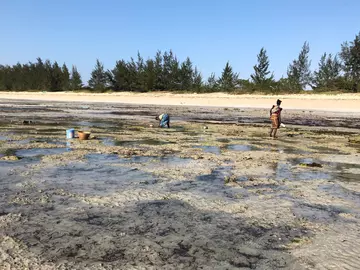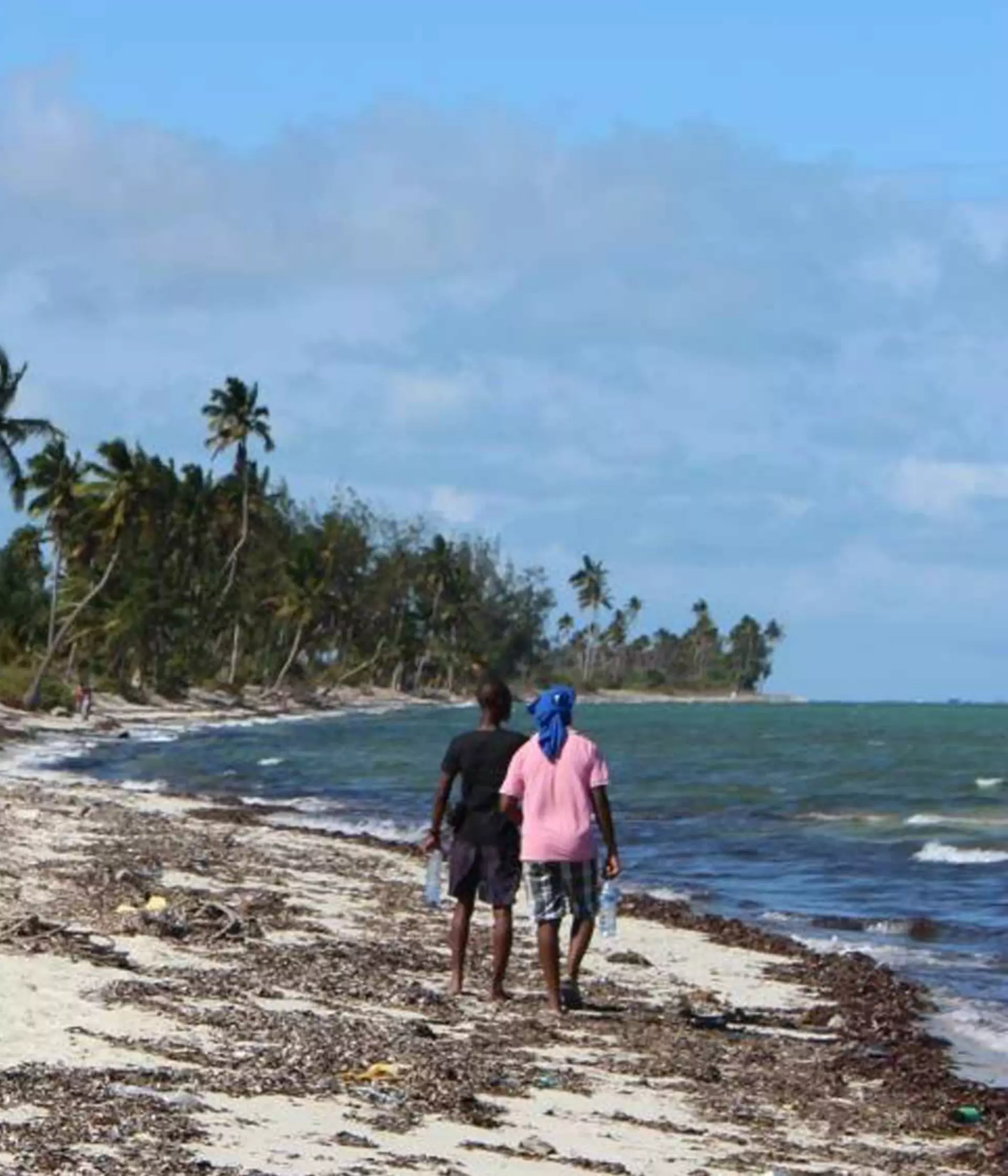Jérémy Huet
Our Sea Our Life Programme Manager
Ana Pinto
Outreach Specialist
Tackling unsustainable fishing practices in northern Mozambique
From climate change to pollution, the pressure on the diversity of marine life is growing across the world. Unsustainable fishing practices such as bottom trawling and ghost fishing are an urgent problem that threatens the stability of ecosystems, food security and livelihoods.
Sealife in Africa is under threat. In northern Mozambique, climate change, overfishing, unsustainable fishing practices and growing populations in coastal areas have taken their toll on local marine resources.
Critical to the lives and livelihoods of coastal communities, we’re collaborating with local people to protect and restore the marine ecosystem to create a healthier and more sustainable future.
With the Our Sea Our Life project, we work with vulnerable communities to manage local fisheries, using nature-based solutions. We work to improve the resilience of coastal ecosystems and community well-being by creating community fishers' councils to manage marine areas. We also develop sustainable financing mechanisms, and support Village Savings and Loan Associations to invest in alternative small-scale businesses and secure a diversity of income.
Women and men often have defined and differing roles in small scale fishing communities. We recognise to implement a truly effective, sustainable and scalable model we need to identify opportunities to create strategies to involve women in discussions and the decision-making process. Research from the development sector shows that improving the well-being of women is one of the most effective tools to bring about significant change when working with traditional impoverished communities.
This video explains how we're empowering local women together with protecting wildlife, prepared by and shown at the European Development Days (EDD) event, in June 2018.
We coordinate Our Sea Our Life in collaboration with AMA (previous collaborators on Our Sea Our Life include CORDIO East Africa, FCSH-NOVA, and UniLúrio).
Threats to sealife in Africa
Marine resources are threatened by:
Rapid changes resulting from growing human populations
Climate change impacts
Increasing linkages to markets for marine products
Illegal and foreign commercial fishing fleets
Immigrant and immigrant fishers moving away from depleted stocks
High-end tourism developments that are often poorly integrated with local communities and often restrict access to marine resources
Most recently the planned exploitation and refining of huge natural gas reserves that are expected to account for 13% of the national economy within the next five years. These changes leave local populations increasingly vulnerable.
Our Sea Our Life supports community-led marine areas in coastal communities in northern Mozambique. It contributes directly to biodiversity conservation by taking a species-specific approach.
Declines in biomass of species of conservation concern (eg, the Endangered Napoleon wrasse and Threatened sharks, IUCN 2012) and important functional groups (eg, herbivores) are to be stabilised. Declines in the health and cover of the most important and vulnerable marine habitats - reef-building corals, mangroves and seagrasses – are to be halted.
These actions reduce pressure on coastal marine ecosystems, increase resilience to climate change and improve food security.
Take a look at the science going on during the project, this short was prepared for and shown at the Western Indian Ocean Marine Science Association (WIOMSA) symposium in October 2015.
How we support sealife in Africa
Our Sea Our Life develops sustainable mechanisms to finance the management by the community fisheries councils in northern Mozambique.
A continuous participatory work with coastal communities defines incentives specific to each community to bridge the short-term opportunity costs of conservation. Village Savings and Loan Associations encourage members to invest in alternative small-scale businesses to diversify their income. The project Our Sea Our Life alleviates the pressure on marine resources and secures local livelihoods.
Improvement of the management and governance of a Locally Managed Marine Area in northern Mozambique
Since 2019, we've been supporting the creation of two Locally Managed Marine Areas (LMMAs) in Bandar and Mecufi (southern Cabo Delgado province) which are now fully operational. Four years on, we are at a critical junction in the operations of the LMMA to determine the management effectiveness of the LMMA model, and if current practices deliver the social and environmental goals laid out in the LMMA co-management plan. The assessments will inform improvements in management of the LMMAs, as well as emerging policies and community of practice for LMMAs more broadly.
Between 2020 and 2021, the programme undertook assessments of the Locally Managed Marine Area (LMMA) of Bandar, working with the Community Fishery Council (CCP) who is responsible for the management of this LMMA. The assessments, funded by a Small-Technical Grant awarded to the programme by BIOPAMA, were completed using two diagnostic tools: the Site-level Assessment of Governance and Equity (SAGE) and the Integrated Management Effectiveness Tool (IMET). By assessing the effectiveness of the co-management measures and the quality of governance using IMET and SAGE diagnostics, we have utilised tools and methods already employed in Mozambique’s terrestrial protected areas (PAs), facilitating much needed synergies between community-led and government-led PA conservation efforts in Mozambique. These assessments resulted in clear result-oriented recommendations especially (i) to improve the definition of the roles and responsibilities of stakeholders in LMMA enforcement, (ii) for vulnerable community members to access sustainable livelihoods, (iii) to build local capacity in mangrove rehabilitation and (iv) to engage community members in socioeconomic and biological monitoring.

As part of this next phase of the programme, OSOL will support capacity building of 15 members of the Bandar CCP, seven of whom are women. The CCP members will be trained in finance, planning, legislation, environmental communication and interventions, inclusive and equitable decision-making, and biological monitoring. Further to this, an enforcement plan for the Bandar LMMA will be developed and implemented in partnership with stakeholders to address unsustainable fishing practices and mangrove habitat use. The CCP will be empowered to monitor improvements in Catch Per Unit Effort for two key indicator species.
Additionally, the project will work with local actors to support the adoption of sustainable livelihoods. Vulnerable community members in Bandar previously engaged in unsustainable livelihoods (e.g., mosquito net fishing and producing salt ponds) will engage in bivalve aquaculture farming, supported by improved bivalve supply chains. The Bandar CCP will receive mentoring to continue to implement and monitor behaviour change interventions (including environmental education and public awareness), contributing to enabling conditions for change beyond project timeline.
Finally, the project will assess the potential of the Bandar LMMA to act as a pilot site for a commercial-scale blue carbon project, with the scope of a blue carbon solution developed through carbon modelling and a land tenure feasibility study of mangrove sites requiring rehabilitation and LMMA strengthening.
Partners and Sponsors:
With thanks to the support of the European Union and the Organisation of African, Caribbean and Pacific States through the BIOPAMA Programme.
ZSL works in partnership with:
AMA (Associação do Meio Ambiente)
People involved
Jérémy Huet is the Our Sea Our Life Programme Manager
Ana Pinto is the Outreach Specialist
Susie Offord-Wolley is the Conservation Networks Manager
Hannah Klair is the Conservation Programme Coordinator
Partners:
This project has received support from:
Urgent action to stop the devastation of critical species and habitats by helping people and wildlife live better together, is the only way to save the natural world we love and depend upon. That’s where ZSL comes in, and where you can play your part.
